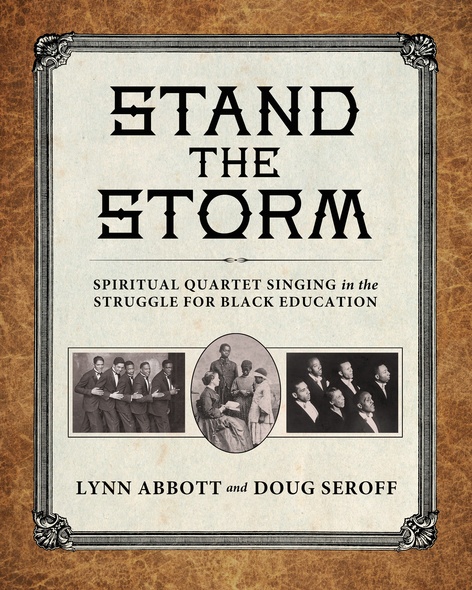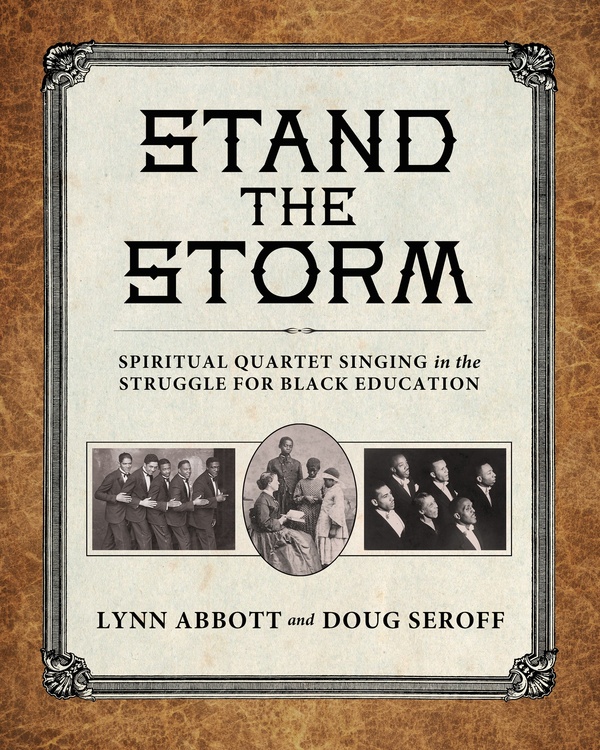
Stand the Storm
Spiritual Quartet Singing in the Struggle for Black Education
Black education in the South was the great social program of the post–Civil War era. Desperately strapped for operating capital, the first freedmen’s schools resorted to a bold fundraising experiment. Student troupes were sent to the North singing Negro spirituals, the sacred songs of slavery, in order to generate goodwill and entice financial support. The Fisk University Jubilee Singers set this strategy in motion in 1871; in the wake of their success, it was adopted by HBCUs throughout the Southland. Intrepid student singers introduced the outside world to the Negro spirituals, the “genuine jewels” they brought from their bondage, and “sang up” school buildings in the process. Negro spiritual singing was a revelation for the northern public; it was their initial exposure to an emergent, distinctly American kind of creative energy. Male quartets became the standard-bearers of this venerable Black music tradition.
In Stand the Storm: Spiritual Quartet Singing in the Struggle for Black Education, award-winning authors Lynn Abbott and Doug Seroff dive into the history of three generations of fundraising quartets from seven representative schools: Fisk, Hampton, Tuskegee, Penn, Calhoun, Utica, and Piney Woods. They acknowledge the heroic founders of the schools and restore the names of forgotten singers to the historical record. They reevaluate the industrial education model that guided these schools. Finally, they plot the evolution of Negro spiritual singing after Emancipation by scrutinizing early published song collections and comparing them with songbooks and recordings from subsequent eras.
Lynn Abbott is an independent scholar living in New Orleans. His work has been published in American Music, 78 Quarterly, American Music Research Center Journal, and The Jazz Archivist. Doug Seroff is an independent scholar living in Greenbrier, Tennessee.His work has appeared in American Music, Popular Music and Society, Blues Unlimited, and the Rag Time Ephemeralist, among others. Abbott and Seroff are coauthors of Out of Sight: The Rise of African American Popular Music, 1889–1895; Ragged but Right: Black Traveling Shows, “Coon Songs,” and the Dark Pathway to Blues and Jazz; The Original Blues: The Emergence of the Blues in African American Vaudeville; and To Do This, You Must Know How: Music Pedagogy in the Black Gospel Quartet Tradition, all published by University Press of Mississippi.
Contents
Acknowledgments
Introduction: “Remember Me”
Part I: Fisk University
Prologue: A Brief Remembrance of the Original Fisk University Jubilee Singers
Chapter 1: “A Voice in the Wilderness”: The Fisk Jubilee Singers’ Civil Rights Tours of 1879–1882
Chapter 2: The Jubilee Singers Under Mrs. James A. Myers
Part II: Industrial Education
Prologue 1: The Life and Times of Samuel Chapman Armstrong, Founder of Hampton Institute
Chapter 1: The Hampton Institute Quartet
Prologue 2: Booker T. Washington and His Critics
Chapter 2: The Tuskegee Institute Quartet
Part III: Satellite Schools
Chapter 1: Penn School
Chapter 2: Calhoun Plantation Songs
Chapter 3: The Utica Institute Jubilee Singers
Chapter 4: Piney Woods Country Life School and the Cotton Blossom Singers
Notes
Bibliography
Index




